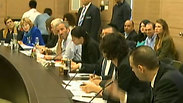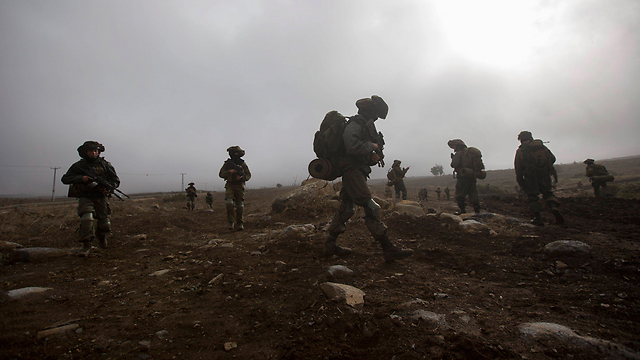
Knesset approves raises for MKs, but not for soldiers
Members of Knesset to receive NIS 700-1,500 raise starting January 1, bringing their salaries to roughly NIS 41,000 a month, while effort to add NIS 700 to conscripts' pay fails.
Members of a Knesset committee voted on Tuesday to give MKs a pay raise in a 11-4 vote while a day later, the Knesset struck down a proposed bill to increase salaries for conscripts.
In January 2016, MKs' salaries are expected to rise by NIS 700-1,500 ($180-$385) a month, depending on how much the overall average salary rises in all of 2015. The bill that failed would have given conscripts an additional NIS 700 a month.
Representatives in Israel's parliament currently earn NIS 40,029 ($10,298) a month. Average salaries in Israel are expected to rise in at least 3.5 percent in 2015, an unusually high increase.
The system to set raises for MKs has been the target of criticism for years.
After the Knesset House Committee did not convene to discuss the matter for months, Chairman David Bitan convened one meeting, in which MKs rejected a recommendation by a public committee to peg MKs salaries to the consumer price index, as is the case for other public officials.
MKs Shelly Yahimovich (Zionist Union) and Yael German (Yesh Atid) appealed this decision, leading Bitan to convene the committee again on Wednesday.
Bitan proposed that MKs salaries by automatically raised on January 1, like every year – but because the minimum wage increased this year, affecting the average overall salary increase, its effect will be removed from the equation and MKs will receive a smaller pay raise.
Thus, while wages of most workers did not rise, the committee prevented their salaries from being frozen.
Eleven committee members voted in favor of Bitan's proposal: from Likud, these were Bitan himself, Nava Boker, Nurit Koren, Miki Zohav, David Amsalem and Oren Hazan, as well as Robert Ilatov (Yisrael Beytenu), Israel Eichler (United Torah Judaism), Yinon Magal (Bayit Yehudi), Yoav Ben-Tzur (Shas), and Tali Ploskov (Kulanu).
Four MKs voted against it: From the Zionist Union, Shelly Yachimovich and Merav Michaeli, and Yoseph Yona as well as Yael German (Yesh Atid).
A day after the committee approved the raise, the Knesset struck down the bill proposed by Yesh Atid to raise living allowances for conscripts by NIS 700 (around $180) a month. Thirty-eight MKs voted in favor of the proposal by MK Yaakov Perry, while 48 voted against it. The bill also failed to pass a ministerial committee earlier in the week.
The bill sought to raise living allowances, which currently range from NIS 539 - 1,075 (about $139 – 277), by NIS 700 in three stages, in accordance with the increase in the minimum wage.
The bill argued that the additional cash "will permit a reasonable existence for those who serve throughout the duration of their service, without depending on parents or going into debt."
MKs who backed the proposed bill said it was "particularly important these days, when the scope of draft evasion among compulsory recruits has reached very high levels. This would serve as a suitable reward for the population that does not evade the draft and fulfills its duty with much dedication."
The proposal was rejected because among other things, the IDF has been working on a streamlining process that will involve a discussion of raising wages.
Soldiers expressed disappointed by the development. "Soldiers received an announcement that their salaries would not be raised," said a lone soldier. "I may get 2,300 shekels but can't get through the month. But I'm not the issue. What about a soldier who gets 600 shekels a month? For example, I have 900 shekels left after paying 1,400 shekels for rent, and that doesn't include bills like electricity and water. Every weekend I go home and feel terrible. But I'm not the issue. It's unreasonable for people to live off their parents."
Another soldiers said he receives NIS 658 a month. "It's shameful," he said. "When I'm hungry I debate whether to buy myself a drink together with my falafel. My parents don't always have money, and how much can I ask of them? I spend the money on basic things like clothes.
"A yeshiva student gets 2,500 shekels and a soldier who does more than him gets less," he added. "In my opinion, they should give 2,000 shekels, doesn't have to be more – just something to live off so we can breathe."












